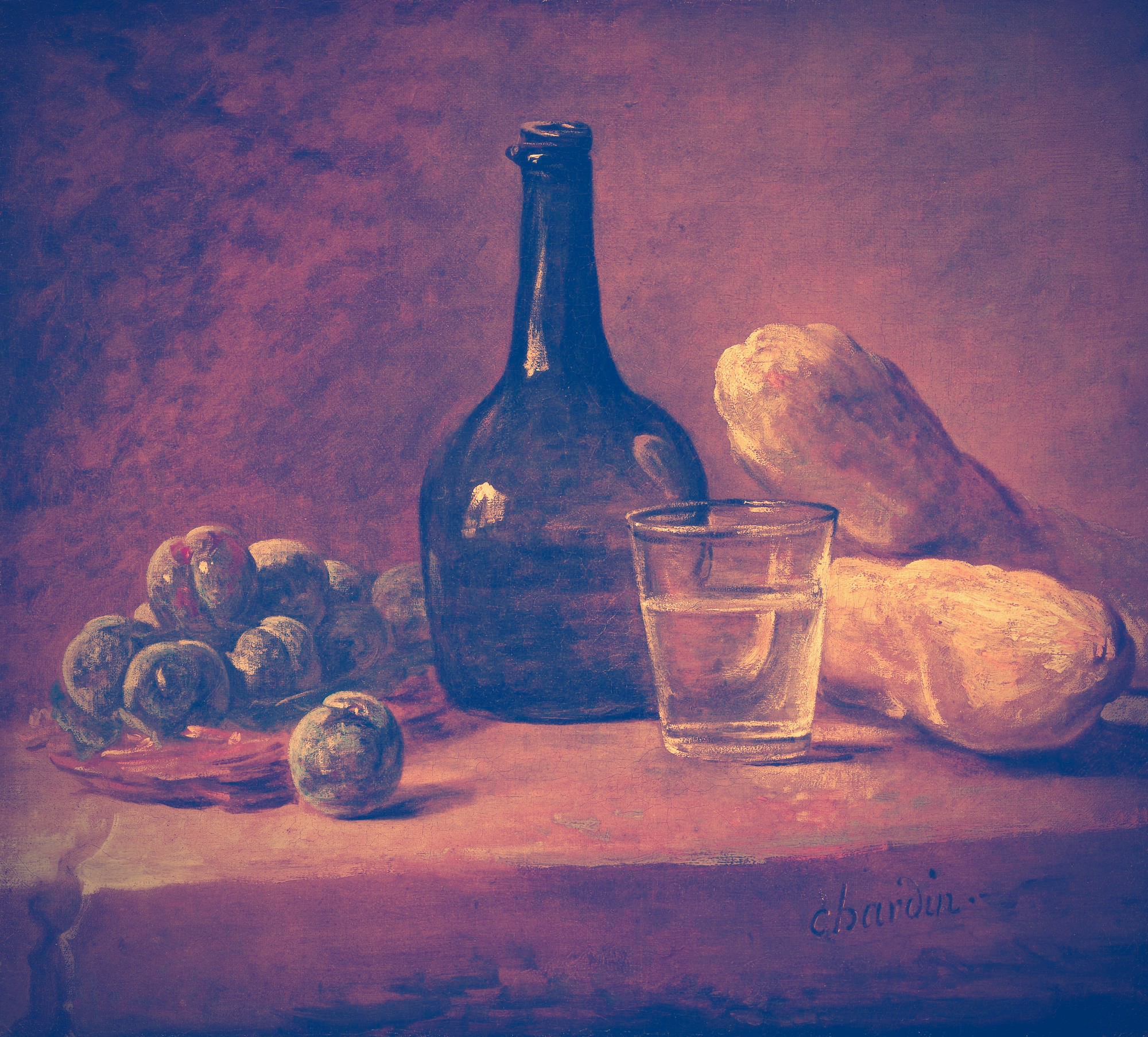Some Thursdays are so darkly grey and deeply blue that, come three or four, there really is nothing to be done with them than go to an art museum.
In 1895, perhaps, incidentally, on a Thursday, a then unknown young man, then twenty-four years old, took himself and his reader on a journey to the Louvre. Proust skipped the classics – Winged Liberty, Venus, Psyche – , walked right past the drowning men, coronated emperors, and topless women leading revolutionary French. Even past the Impressionists, the Masters of the Renaissance, to the La Caze room: the gallery of eighteenth-century French painters.
Anticipation. He finally reached his destination, stopped and stopped his reader with him:
‘Look.’
Anticlimax. A few plums, a glass of water, a bottle, some squash, on a wooden table. The canvas is small and dark. The artist, equally obscure. A certain Jean-Baptiste-Simeon Chardin. There was no one else around. The room was still and empty.
A cursory glance would have done, but no. Observe the plums, he said. Round, plump, almost sensually. Purple, almost red, that veers into an inky night blue. Half light. Dozens of shades. Skin stretched taut, barely bruised, gleaming over sweet, ripe insides. Insides unseen. Insides you guess at, almost bite into, almost taste. You almost wipe the trickle of juice that escapes to your chin.
A taste so intense you almost reach for the glass of water. The squash, like liquid gold, is reflected on it. Inside the cup, crystalline, the water is so serene it feels almost immoral to disrupt it. You watch it instead, stilled. By your side, your palms feel cool, though you have not touched the glass. Your throat is dry. You gulp like a gasp and almost taste the word quench. You feel the water fill you, the purest you have never drunk. Now,
Proust wrote of his companion, dulled and disappointed by this life devoid of treasure, castles, gods and goddesses, kings, adventure, lust; this life, which was just ordinary; now, in that moment, in that place,
‘I should say to him: are you happy?’
Chardin did not paint great battle scenes, heroic feats, dazzling landscapes, opulent meals. His women were not breathtaking, or young, or royalty. His interiors were simple, even plain. They contained bowls of fruit, loaves of bread, knives, water jugs, coffee pots, slabs of meat, half-drunk glasses of wine, cups of tea. Sometimes, a man reading a book, a mother and daughter sewing. But mostly, everyday objects that, every day, we don’t see.
He did, and painted them, and his brush made them glow. Plums became jewels, salt crystals diamonds, water an elixir. Fresh bread from the market, just as it is, a feast.
Still life with plums. The French call it nature morte. For once, the French are wrong. It is anything, anything but.
Anything but dead. It is magic, real magic you can see. Magic you can touch and taste and wipe off when it gets sticky. Magic on a kitchen table, yours, that comes alive – you with it – as it swells beyond the canvas and spills off the borders.
Still Life. Proust called Chardin’s work ‘a political manifesto on behalf of the dignity of the ordinary’ lives we lead. A window onto a wondrous world, simple, imperfect, familiar, charming, ‘uncommonly, wonderfully tempting.’ Do you see it?
Be still. This is your life. Ordinary moments in frames. Beautiful because they are real, beautifully fragile, fleeting. Unglamourous and untouched. In them, bruised hearts and knees, bills and dust shoved into corners, chips on glasses, stains on sleeves, papercuts and stovetop burns, dinner burnt too. You laugh. No nocturne at the art museum tonight. Better: story time.
Goodnight stars. Hair that smells of lemon. Goodnight moon. Hands that clutch yours. Goodnight cow, jumping over the moon. The sleepy fingers let go. Goodnight room, and red balloon. Kisses on lashes and cheeks. Goodnight kittens, mittens… Eyes droop. Little chests lean into yours. And in the kitchen, bits of plum and strawberry on the countertop, still.
